25 Sep 2015 | Bahrain Statements, Campaigns, mobile, Statements
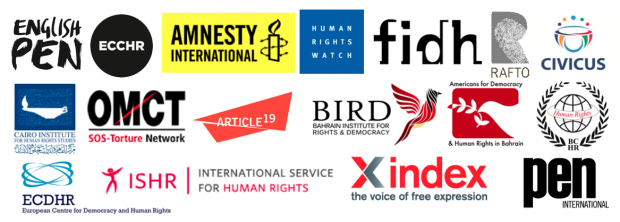
The Bahrain Institute for Rights and Democracy, alongside 16 NGOs including Index on Censorship, today voiced support for the UN joint-statement on human rights in Bahrain. The statement, delivered by Switzerland at the 30th session of the UN Human Rights Council, was co-signed by 33 countries, including 19 EU states and the United States of America.
The statement remains open for additional signatories until the end of the Human Rights Council session on 2 October 2015. The NGOs invite states who have not signed to do so and call on those who have to continue exerting collective pressure for human rights progress in Bahrain.
Letter
To the Governments of: Albania, Argentina, Bosnia and Herzegovina, Brazil, Canada, Croatia, Cyprus, Finland, Greece, Hungary, Italy, Malta, Mexico, Republic of Korea, Serbia, Slovak Republic, and Spain
24 September 2015
Excellencies,
We, the undersigned non-governmental organisations, write to voice our support for the joint statement on the human rights situation in Bahrain delivered by Switzerland at the 30th Session of the Human Rights Council (HRC).
Since the last joint statement on Bahrain in June 2014, the government has continued to curtail the rights to freedom of expression, association and peaceful assembly. Human rights defenders, political opposition leaders, members of the media, and youth have faced intimidation, arrest, arbitrary detention, unfair trials and acts of reprisal by the authorities. Furthermore, negotiations of the Office of the High Commissioner for Human Rights’ (OHCHR) for a programme of technical capacity building in Bahrain have stalled in the period since the June 2014 joint statement.
We urge your government, therefore, to sign the joint statement on Bahrain delivered by Switzerland at the HRC’s 30th session in order to refocus international attention on human rights in Bahrain and encourage the government of Bahrain to constructively address its ongoing violations.
International pressure on Bahrain continues to assist in addressing human rights violations in Bahrain, as reflected by the decision of the King of Bahrain to release prominent human rights defender Nabeel Rajab under a royal pardon after he spent over four months in prison for a tweet criticising the government.
It is critical, therefore, to take action now to reaffirm the high level of international concern over human rights conditions in Bahrain. To abandon collective pressure on Bahrain at a time when the situation is continuing to deteriorate would send an entirely wrong message to the Bahraini government, and undermine both internal and external efforts to foster genuine reform.
Switzerland has indicated that this joint statement will be open for additional signatories throughout the session. We therefore call on your government to recommit to supporting human rights in Bahrain, and to add your endorsement to this joint statement.
Sincerely,
Americans for Democracy & Human Rights in Bahrain (ADHRB)
Amnesty International
ARTICLE 19
Bahrain Centre for Human Rights (BCHR)
Bahrain Institute of Rights and Democracy (BIRD)
Cairo Institute for Human Rights Studies (CIHRS)
CIVICUS: World Alliance for Citizen Participation
English Pen
European Center for Constitutional and Human Rights (ECCHR)
European Centre for Democracy and Human Rights (ECDHR)
Human Rights Watch
Index on Censorship
International Service for Human Rights (ISHR)
Pen International
Rafto Foundation
The International Federation for Human Rights (FIDH)
World Organization Against Torture (OMCT)
20 Apr 2015 | Greece, mobile, News and features
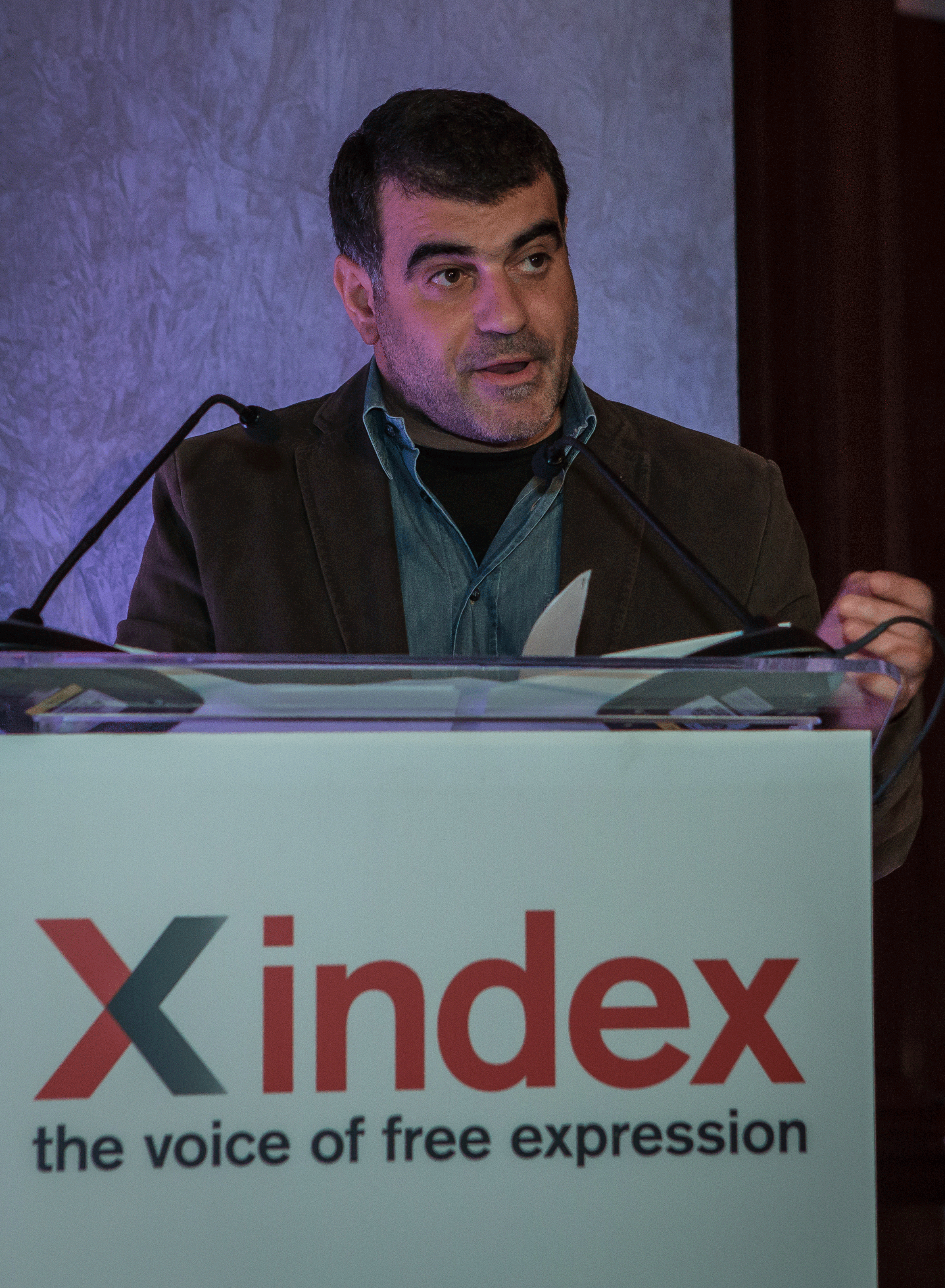
Kostas Vaxevanis won the 2013 Index on Censorship Journalism award for his investigative journalism through his work on the magazine Hot Doc. On 30 March 2015 he was convicted of criminal defamation for his reporting on banking irregularities in Greece and given a 26 month suspended sentence.
The justice system of Greece is often compared to a very thin fishing net, which catches the small fish, but which allows the bigger, stronger fish to break free.
It is a widely-held belief in Greece that there is a lack of justice administered by the country’s judicial system, and this belief is confirmed if one looks at recent history.
None of the major scandals of recent years — ranging from that of the Athens Stock Exchange to the scandal involving judges who conspired in the rigging of court cases — resulted in any guilty verdicts.
A few days ago, the Greek justice system sentenced former finance minister Giorgos Papakonstantinou to a mere 12 months’ imprisonment for his removal of names from the so-called Lagarde List of alleged Greek tax evaders with Swiss bank accounts, while he was not convicted for the most serious charges against him, namely, his inaction with regard to the individuals named on the list. However, this paradoxical situation, in which the Greek justice system charged and attempted to prosecute me on two occasions over the publication of the Lagarde List but did not sentence the government minister who concealed it, does not stop here. At the same time that a Greek court issued a paltry 12 month prison sentence to Papakonstantinou, a different court sentenced me to a 26 month suspended sentence, following charges that were filed against me by one of Greece’s major oligarchs, businessman Andreas Vgenopoulos.
Investigative reports which were publicised in the magazine which I publish, Hot Doc, revealed that Andreas Vgenopoulos had purchased the Cyprus-based Marfin Bank, which he then utilized in order to provide capitalization to other business interests of his and to those of his fellow oligarchs. According to the Cypriot government, Vgenpoulos’ actions with Marfin Bank was one of the main factors which resulted in the collapse of the country’s economy.
All of the reports which were published in Hot Doc were derived form official documents from the parliament of Cyprus, from Cypriot prosecutors, from Greek courts, and from the central banks of Greece and Cyprus. On the basis of documentation, anti-corruption prosecutors were obliged to launch an investigation regarding the financial activities of Vgenopoulos.
Even though this investigation is still in progress, along with a parallel investigation being conducted by Cypriot authorities, who have also issued a warrant for the freezing of Vgenopoulos’ assets totaling €2.4 billion, I was tried and sentenced by a Greek court on charges of libel. In court, I provided documentation from the vice prosecutor of the Greek Court of Appeals, who was requesting that Greek authorities investigate Vgenopoulos on allegations of bribery and money laundering based on evidence held by Cypriot authorities. Despite this, I was found guilty and issued a sentence that is greater than that issued by the Greek judicial system to a former Greek government minister, Giorgos Papakonstantinou.
In contrast to the standards of European law and European court decisions, which have made it clear that journalists are obligated to maintain a critical stance and, often, a strong and aggressive tone towards public figures, the Greek court which tried me concocted “malicious intent” on my part. Indeed, it is notable that the prosecutor, who was the same individual which had requested that I be sentenced for my revelation of the Lagarde List, on the basis of an unprecedented assertion: that I am “a very good journalist”, which means that my actions were undertaken “with malicious intent, and not out of ignorance”. This is unprecedented in global legal history.
Following my sentencing, numerous international organizations and actors responded, including the OSCE and the International Federation of Journalists, but once again, the only reaction in Greece was a guilty silence. At the present time, I am personally facing, along with Hot Doc magazine, no less than 42 different criminal cases and lawsuits. These are charges filed by politicians and oligarchs, whom we have investigated as part of our journalistic responsibilities. None of these individuals have officially responded to any of our revelations, as public figures are obliged to do.
Instead, they have resorted to legal means while attempting to influence public opinion by saying that they “will punish the slanderer in court”. In this way, they avoid responding to the revelations made against them and employ the justice system in their favour, to hold journalists hostage. It should be noted that Hot Doc’s legal bills for all of these different cases have surpassed €100,000.
The ultimate aim of this coordinated effort of charges and lawsuits against me and my magazine is to force us to reach a settlement, or to otherwise lead to our economic obliteration. It is rare for a journalist to challenge a coordinated and corrupt system, which also holds influence over specific individuals within the legal system, who then hold the power to issue specific sentences and decisions upon request.
Meanwhile, freedom of the press is rapidly being transformed into an altar upon which everyone pretends to worship, but which contains many skeletons within.
Unfortunately, the same is true of justice in Greece as well, resulting in a system where even honest justices often operate in fear of displeasing a government minister or major business figure, who has the power to file charges against them and destroy them.
When former defense minister Akis Tsohatzopoulos was arrested, his personal effects included notes on coordinated actions he would undertake with business figures, in order to destroy prosecutors who were continuing investigations against him. The justice system, in turn, did not have the courage to further examine this and to investigate those who plotting to kill their fellow prosecutors, instead allowing these crucial pieces of evidence to get “lost” in the mountains of paperwork relating to this case.
In this most blatant of manners, judges and prosecutors who depart from the judicial branch in Greece later become legal consultants to the same business figures which, until recently, they held a responsibility to investigate and prosecute. And this convoluted web of corruption and injustice is veiled behind a legal system which issues harsh punishments for charges such as that of libel. This legal system arrests and prosecutes “slanderers”, but, God forbid, never any major fraudsters or corrupt politicians. The very concept of an independent judiciary is devalued on a daily basis in Greece, in the eyes of justice and common sense. If one asks judicial professionals to tell you about justice, they can refer you to a whole range of laws, but to far fewer instances of true justice being served or public figures having been imprisoned.
This column was posted on April 20 2015 at indexoncensorship.org
11 Feb 2015 | Azerbaijan, Azerbaijan Statements, mobile, News and features, Statements
In January, Index on Censorship reported on the beginning of the trial of human rights activist Rasul Jafarov, who is being tried on spurious charges. The Azerbaijani embassy has written to Index on Censorship responding to that article. This is the Index response to the embassy.
Dear Ambassador Tahir Taghizadeh,
Thank you for your letter in response to our report on the beginning of the trial of human rights and democracy activist Rasul Jafarov.
In your letter, you wrote:
“In my country, human rights and fundamental freedoms are ensured in full compliance with the national and international commitments that Azerbaijan has subscribed to. No one is persecuted for his/her political views and activities as proved by Azerbaijan’s vibrant political process and free and diverse media.”
We beg to differ with your point of view.
Azerbaijan’s record on human rights and a free press has been discussed with great concern at the international level many times in recent years.
In March 2012, Index on Censorship joined with Article 19, Human Rights House Foundation, International Federation of Journalists, Media Diversity Institute, Norwegian Helsinki Committee, Reporters Without Borders and World Association of Newspapers and News Publishers to co-produce Running Scared: Azerbaijan’s Silenced Voices. The report opened with this stark warning: “The current state of freedom of expression in Azerbaijan is alarming, as the cycle of violence against journalists and impunity for their attackers continues; journalists, bloggers, human rights defenders and political and civic activists face increasing pressure, harassment and interference from the authorities; and many who express opinions critical of the authorities – whether through traditional media, online, or by taking to the streets in protest – find themselves imprisoned or otherwise targeted in retaliation.”
In December 2012, the Parliamentary Assembly of the Council of Europe issued a monitoring report that included the comments that the “situation with regard to basic freedoms, including freedom of expression, freedom of assembly and freedom of association is preoccupying. The committee expresses its alarm at reports by human rights defenders and domestic and international NGOs about the alleged use of so-called fabricated charges against activists and journalists. The combination of the restrictive implementation of freedoms with unfair trials and the undue influence of the executive results in the systemic detention of people who may be considered prisoners of conscience. Alleged cases of torture and other forms of ill-treatment at police stations, as well as the impunity of perpetrators, raise major concern”.
In April 2013, the Human Rights Council of the United Nations work group issued its report from Azerbaijan’s universal periodic review. Among the recommendations were suggestions for improvements on human rights and more specifically freedom of expression:
• Ensure the full enjoyment of the right to freedom of expression in line with country’s international commitments (Slovakia)
• Guarantee the rights to freedom of expression, association and peaceful assembly particularly by allowing peaceful demonstrations in line with the obligations stemming from the International Covenant on Civil and Political Rights (Switzerland);
• Put in place additional and fitting measures to ensure respect for freedom of expression and of the media (Cyprus);
• Ensure that Azerbaijani media regulations uphold diversity among media outlets, as per international standards and best practices (Cyprus);
• Expand media freedoms across print, online and, in particular, broadcast platforms, notably by ending its ban on foreign broadcasts on FM radio frequencies and eliminating new restrictions on the broadcast of foreign language television programs (Canada);
• Take effective measures to ensure the full realization of the right to freedom of expression, including on the Internet, of assembly and of association as well as to ensure that all human rights defenders, lawyers and other civil society actors are able to carry out their legitimate activities without fear or threat of reprisal (Czech Republic);
• Ensure that human rights defenders, lawyers and other civil society actors are able to carry out their legitimate activities without fear or threat of reprisal, obstruction or legal and administrative harassment (Sweden);
• Put an end to direct and indirect restrictions on freedom of expression and take effective measures to ensure the full realization of the right to freedom of expression and of assembly (Poland);
• Ensure the full exercise of freedom of expression for independent journalists and media, inter alia, by taking into due consideration the recommendations of the Council of Europe Commissioner for Human Rights (Italy);
• Ensure that journalists and media workers are able to work freely and without governmental intimidation (Germany);
• Ensure that journalists and writers may work freely and without fear of retribution for expressing critical opinions or covering topics that the Government may find sensitive (Slovenia);
• Protect and guarantee freedoms of expression and association in order to enable human rights defenders, NGOs and other civil society actors to be able to conduct their activities without fear of being endangered or harassed (France);
• Strengthen measures to guarantee a safe and conducive environment for the free expression of civil society (Chile);
• Remove all legislative and practical obstacles for the registration, funding and work of NGOs in Azerbaijan (Norway);
• Ensure that all human rights violations against human rights defenders and journalists are investigated effectively and transparently, with perpetrators being promptly brought to justice, including pending unresolved cases requiring urgent attention (United Kingdom);
• Ensure prompt, transparent and impartial investigation and prosecution of all alleged attacks against independent journalists, ensuring that
the media workers do not face reprisals for their publications (Slovakia);
Though Azerbaijan has the modern legal framework in place to respond to these suggestions from the international community, the respect for the rule of law is sorely lacking.
In October 2013, Index on Censorship published Locking up free expression: Azerbaijan silences critical voices, which described the situation in your country in the run up to the presidential elections.
We wish that was the end of the story, that our insistence that Azerbaijan respect free of expression was based on outdated information or thoroughly implemented international recommendations.
But in 2014 the assault against journalists and human rights activists accelerated with detentions of well-respected individuals with international profiles and the temerity to speak some uncomfortable truths to the government of Azerbaijan.
These are just a few of the cases against journalists and human rights activists that we follow:

Anar Mammadli and Bashir Suleymanli
Anar Mammadli and Bashir Suleymanli — sentenced to 5.5 and 3.5 years respectively in May 2014 — are prominent human rights activists and founders of the Election Monitoring and Democracy Studies Centre. They were arrested and jailed in 2013, following outspoken criticism of presidential elections in October 2013, despite international protests. Those are the same polls that invited election observers from the OSCE found lacking. On 29 September 2014, Mammadli was awarded the Václav Havel Award for Human Rights by the Council of Europe.
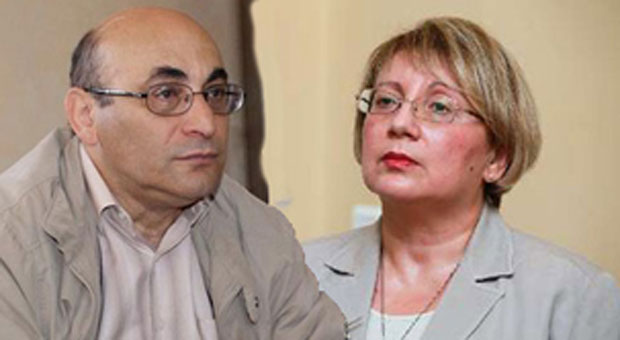
Arif and Leyla Yunus (Photo: HRHN)
Leyla Yunus — arrested 30 July 2014 — is the director of the Peace and Democracy Institute, which among other things works to establish rule of law in Azerbaijan. She has been charged with state treason (article 274 of the Criminal Code of the Republic of Azerbaijan), large-scale fraud (article 178.3.2), forgery (article 320), tax evasion (article 213), and illegal business (article 192). On 18 February, her pre-trial detention was extended for another five months. Her husband Arif Yunus was arrested 5 August 2014. Arif Yunus is facing charges of state treason and fraud. Both have had their initial three month pre-trial detentions extended.
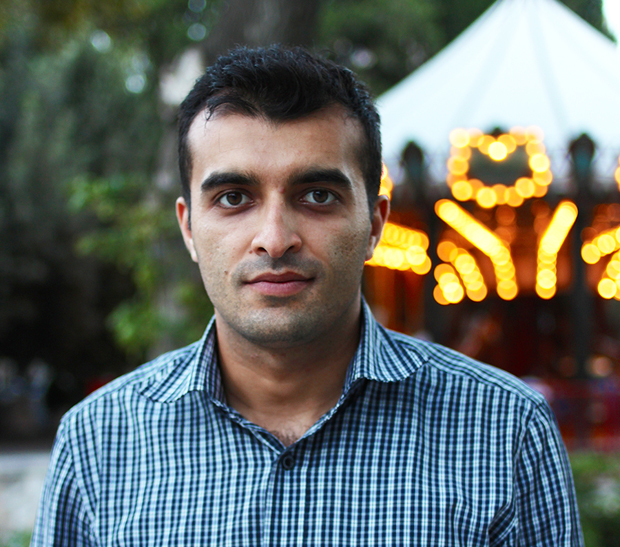
Human rights and democracy activist Rasul Jafarov (Photo: Melody Patry)
Rasul Jafarov — arrested 2 August 2014 — one of the initiators and coordinators of the campaign “Sing for Democracy” and “The Art of Democracy”, advocated for the rights of political prisoners, actively participated in the International Platform “Civil Solidarity.” He is accused of: tax evasion (Article 192), illegal business (Article 213) and malpractice (Article 308). The charges carry a possible sentence of 12 years.
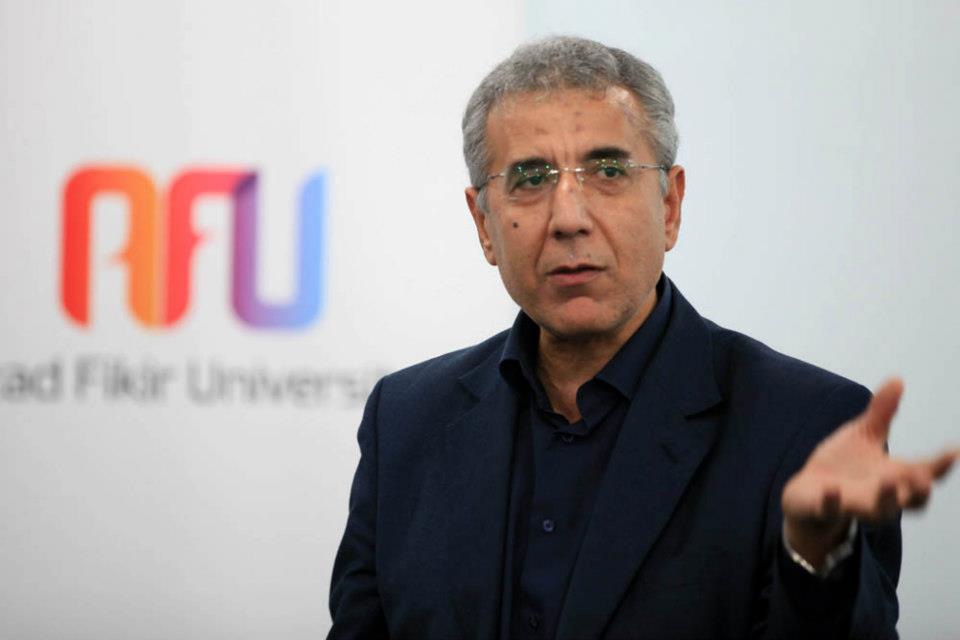
Lawyer Intigam Aliyev
Intigam Aliyev — arrested 8 August 2014 — is a human rights defender and a lawyer specialized in defending rights of citizens in the European Court of Human Rights. He is charged with Articles 213.1 (tax evasion), 308.2 (malpractice) и 192.2 (illegal business) of the Criminal Code. Index was heartened to hear that Aliyev was at least allowed to sit with his lawyers in court on Feb 3.
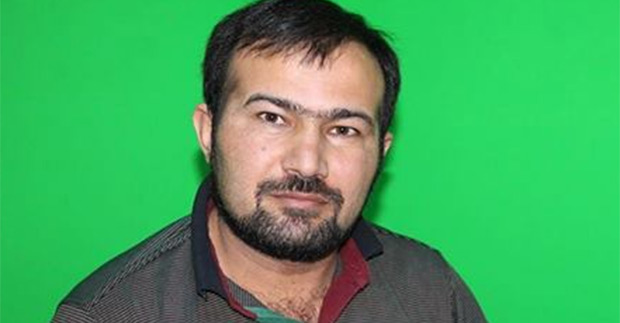
Journalist Seymur Hezi
Seymur Hezi — arrested 29 August 2014 — works for independent newspaper Azadliq and host of the news programme “Azerbaijan Hour”. He is a member of the opposition Popular Front Party. Index reported on January 29 that Hezi was sentenced to a five-year prison sentence on charges of “aggravated hooliganism” on 29 January.
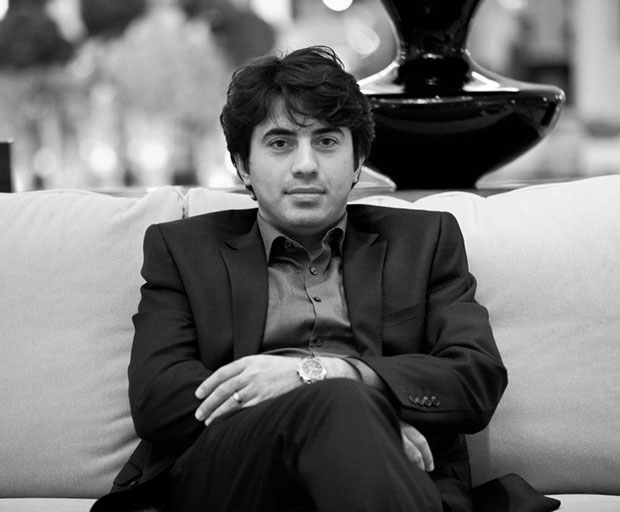
Emin Huseynov, journalist and human rights defender, director of the Azerbaijani Institute for Reporters’ Freedom and Safety (IRFS)
Emin Huseynov — went into hiding in August 2014 — is an internationally recognised human rights defender and leader of the Institute for Reporters’ Freedom and Safety (IRFS). IRFS is the leading media rights organisation in Azerbaijan and one of the main partner organisations of the Human Rights House Network in the country. Huseynov was charged with tax evasion, illegal business and abuse of authority after he went into hiding at the Swiss embassy. Florian Irminger, head of advocacy at the Human Rights House Foundation (HRHF), of which Index is a network member, called on Switzerland to continue to host Huseynov. “His location at the embassy is justified by the level of the repression in the country, the bogus charges brought against human rights defenders in Azerbaijan and the impossibility for them to defend themselves in court, due to the lack of independence of the judiciary and the harassment of their lawyers.”

Khadija Ismayilova
Khadija Ismayilova — arrested on 5 December — is an investigative journalist and radio host who is currently working for the Azerbaijani service of Radio Free Europe/Radio Liberty. She is a member of the Organized Crime and Corruption Reporting Project. She was arrested under charges of incitement to suicide, a charge widely criticised by human rights organizations. Ismayilova is currently being supported by two petition campaigns by Index on Censorship and Reporters Without Borders. On 13 Feb, lawyer Fariz Namazly told Contact.az that new charges have been filed. According to him, Ismayilova is charged under the Article: 179.3.2 (large-scale embezzlement), 192.2.2 (illegal business), 213.1 (tax evasion) and 308.2 (abuse of power.) The charges carry a possible sentence of 12 years.
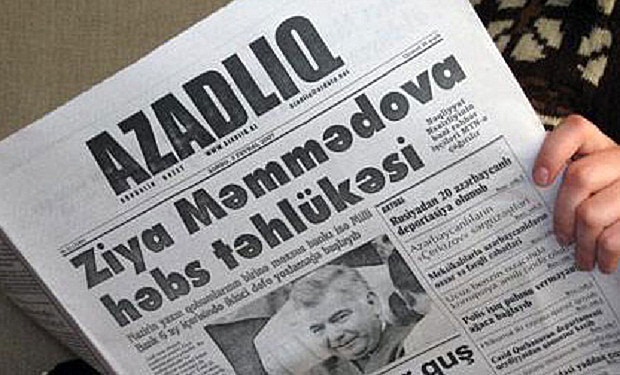
Award-winning newspaper Azadliq was forced to halt its print edition in July 2014 as its bank accounts were frozen. We reported on this in August 2014.
In September, the European Parliament adopted a resolution on the human rights situation in your country.
In November, Nils Muižnieks, the Council of Europe Commissioner for Human Rights, called his autumn 2014 mission to Azerbaijan one of the most difficult of his tenure. He wrote, “In late October I was in Azerbaijan, the oil-rich country in the South Caucasus, which just finished holding the rotating chairmanship of the 47-member Council of Europe. Most countries chairing the organisation, which prides itself as the continent’s guardian of human rights, democracy and the rule of law, use their time at the helm to tout their democratic credentials. Azerbaijan will go down in history as the country that carried out an unprecedented crackdown on human rights defenders during its chairmanship.”
You mention in your letter that individuals are not being arrested for their human rights work but it seems an astonishing coincidence that all these prominent human rights defenders should all be guilty of such an array of financial crimes. And that brings us full circle to the present. Since we received your letter, there have been several developments that we would like to brief you on:
On 29 January 2015, a provisional resolution before the CoE called attention to the cases of investigative journalist Khadija Ismayilova, human rights activist Emin Huseynov and the closure of Radio Free Europe/Radio Liberty. Further on in the resolution PACE was being asked to call on Azerbaijan to properly investigate the murders of journalists Elmar Huseynov (2005) and Rafiq Tagi (2011).
On 3 Feb, President Aliyev signed an amended media law that restricts press freedom by making it easier to shutter media outlets.
Just today, Reporters Without Borders released its World Press Freedom Index 2015, which places Azerbaijan at 162. That’s down 2 spots from last 2014.
We wish Azerbaijan’s commitment to a “free and diverse media” was more than just words and we will continue to report on these detentions – as we do globally – for as long as these words are not translated into action.
Best regards
Jodie Ginsberg
Chief Executive
Index on Censorship
2 Feb 2015 | Egypt, mobile, News and features
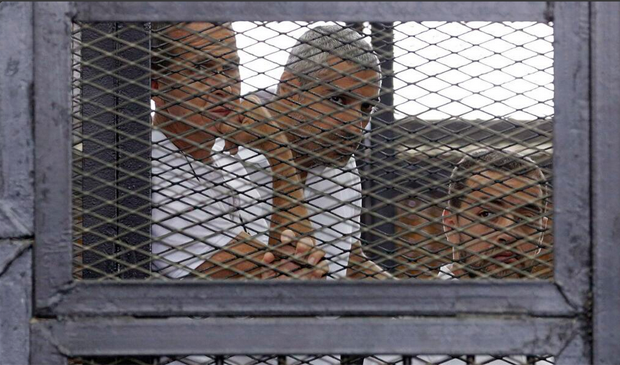
Peter Greste, Mohamed Fadel Fahmy and Baher Mohamed are three Al Jazeera journalists were among those sentenced to prison on terrorism charges.
As journalist Peter Greste returns to Australia to a hero’s welcome home, his two colleagues Canadian-Egyptian journalist Mohamed Fadel Fahmy and Egyptian journalist Baher Mohamed languish in an Egyptian prison.
The three Al Jazeera English journalists have spent more than 400 days in jail for no other crime than doing their work. In June 2014, Cairo court sentenced Greste and Fahmy to seven years in prison while Baher was handed down a ten-year sentence on the charges of “spreading false news and supporting a terrorist group.” Baher was given the harsher sentence for allegedly having in his possession an empty shell case that he had picked up at a protest site.
Analysts said that Greste’s abrupt deportation to his native Australia was the result of immense international pressure and a persistent international campaign for his release. The move followed the issuance of Presidential Decree No. 104 some months earlier, allowing foreign detainees to be deported for retrial in their own countries. The decree issued by President Abdel Fattah El Sisi in November 2014 came in response to widespread criticism of Egypt’s brutal security crackdown on dissent and the stifling of free expression in the country where four years earlier, opposition activists had taken to the streets to demand “Freedom, Bread and Social Justice.”
Former MP Mostafa Bakry had posted a message on his Twitter account on Saturday night (the day before Greste boarded a flight home via Cyprus) stating that the Australian journalist would be released the following day. On Sunday, Bakry followed up his earlier tweet with another message saying that journalist Mohamed Fahmy (Al Jazeera English Cairo Bureau Chief) would also be freed after having his Egyptian nationality revoked. Negad El Borei, Fahmy’s Defence Lawyer meanwhile, told the independent Al Masry El Youm newspaper that while it was necessary by law that Fahmy drop his Egyptian nationality if he wished to be deported to Canada, Fahmy had not decided to do that. A source close to the presidency also denied allegations that the jailed journalist had been granted amnesty, calling the rumour “baseless and unfounded.” Fahmy, has repeatedly denied in court that he has any links with the outlawed Muslim Brotherhood, insisting he was “a patriot” and “would never do anything to harm Egypt’s national security.
Meanwhile, in a letter addressed to President Abdel Fattah El Sisi on Sunday, Fahmy’s mother, Waffa Bassiouny, pleaded for her son’s release on grounds of ill health.
“As a mother and an Egyptian citizen, I appeal to you Mr. President to pardon my son,” she wrote, adding that “Fahmy is innocent and needs urgent medical treatment for Hepatitis C and a shoulder injury.”
Fahmy had suffered from a dislocated shoulder before his arrest and detention in December 2013 but the lack of treatment (despite his repeated pleas to the judge overseeing the case for medical care) has left him with a permanent disability in his right arm. El Sisi had earlier insisted that Egypt’s judiciary was “independent” adding that he could not influence judicial verdicts and would only be able to pardon the detainees once the legal process had been exhausted. On January 1, 2015, the court ordered a retrial for the three journalists but has not yet set a date for the new trial.
While Peter Greste’s deportation has raised hopes for the imminent release of Fahmy (who has dual citizenship), Egyptian producer Baher Mohamed’s sttuation is somewhat more precarious. His case has received far less media attention than his two high-profile colleagues simply because of the fact that he is solely Egyptian, a case that Rights Lawyer El Borei said “underlines the discrimination in Egyptian legislation against local detainees.”
Egyptian media which has aligned itself with the military-backed authorities since the ouster of Islamist President Mohamed Morsi in July 2013, has remained largely silent about the case of the three AJE journalists, (referred to by some media as the “Marriott-cell case”) save for denunciation by some media of Al Jazeera, accusing the Qatari-funded news network of complicity with the outlawed “terror group.” The network has been banned in Egypt since the overthrow of the Islamist President and had its offices ransacked by security forces several times before the imposition of the ban. Before their arrest and detention at the end of December, 2013, the three journalists had worked without valid credentials out of a makeshift studio in the Marriott Hotel in Zamalek.
In a telephone call on Monday (a day after Greste’s release), Jehan Rashed, Baher’s wife who gave birth to their third baby in August last year while her husband was locked up behind bars, decried the country’s discriminatory policies against native Egyptians.
“I know that the two ‘foreign’ journalists will walk free while Baher will be left to bear the brunt of this whole case. He is paying a heavy price for simply being an Egyptian,” she told Index.
She also complained that prominent TV talk show presenter Lamis El Hadidi had the night before referred to Greste and Fahmy by name on her show on the privately-owned satellite channel CBC but had said she was not sure if the third detainee was named Baher.
“This kind of attitude is typical of the discrimination in the country against one of their own,” she said, sounding distraught.
Egyptian journalist Khaled El Balshy meanwhile told Index that members of the Journalists Syndicate had called for an emergency meeting on Tuesday to discuss possible measures to pile pressure on the authorities for the release of 11 journalists currently behind bars in Egypt, including both Baher and Mohamed Fahmy.
“We had previously signed a petition for their release which was presented to the authorities,” El Balshy told Index by telephone. “We feel that it is now time to send the government another reminder,” he added.
El Balshy did not rule out organizing a rally outside the Syndicate in the coming days to press for the release of the journalists whom he said “should be out doing their work instead of being locked up.”
Egypt was listed among the top ten worst jailers of journalists in the world in an annual report published last December by the New York-based Committee for the Protection of Journalists, CPJ. According to the CPJ report, Egypt had “more than doubled the number of journalists behind bars to at least 12 in 2014, including the three AJE journalists.”
While Egyptian citizens and the country’s pro-government media is paying little attention to Baher Mohamed, he is not forgotten by the international community and the foreign media. In reporting Greste’s release on Sunday, several foreign journalists working in Egypt reminded their audience that Greste’s two colleagues “must not be forgotten” and that “the campaign for their release is far from over.”
The plea was echoed by Greste’s family which vowed to continue its campaign until Fahmy and Baher were also released.
At a press conference in Brisbane on Sunday (held before Peter’s arrival home), Peter’s brother Andrew Greste said, “We want to acknowledge that Peter’s colleagues are still in jail.” His father Juris Greste also said that he “felt deeply for those left behind.”
“Peter will not rest until his colleagues are freed,” said Andrew.











